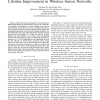Free Online Productivity Tools
i2Speak
i2Symbol
i2OCR
iTex2Img
iWeb2Print
iWeb2Shot
i2Type
iPdf2Split
iPdf2Merge
i2Bopomofo
i2Arabic
i2Style
i2Image
i2PDF
iLatex2Rtf
Sci2ools
122
click to vote
ICCCN
2007
IEEE
2007
IEEE
Dual-Sink: Using Mobile and Static Sinks for Lifetime Improvement in Wireless Sensor Networks
—Mobile sink has been adopted by many schemes for lifetime improvement in wireless sensor networks. It is necessary to propagate the topological or location changes caused by the sink movement across the network for successful data delivery. However, previous studies on using mobile sink either assume that some global information of the network is already available or let the mobile sink convey the global information through repeated network-wide broadcasting. As a result, the gains in network lifetime from sink mobility can be offset by the broadcasting which incurs extra high energy loss. To address this problem, we propose Dual-Sink, an energy-efficient and distributed protocol for data collection in wireless sensor networks. Both a mobile sink and a static sink are used by Dual-Sink. The mobile sink only needs to broadcast its location to a subset of nodes in the network each time when it stops. Simulation results show that when it scales up, the network using Dual-Sink enjoys s...
Related Content
| Added | 07 Dec 2010 |
| Updated | 07 Dec 2010 |
| Type | Conference |
| Year | 2007 |
| Where | ICCCN |
| Authors | Xiaobing Wu, Guihai Chen |
Comments (0)

